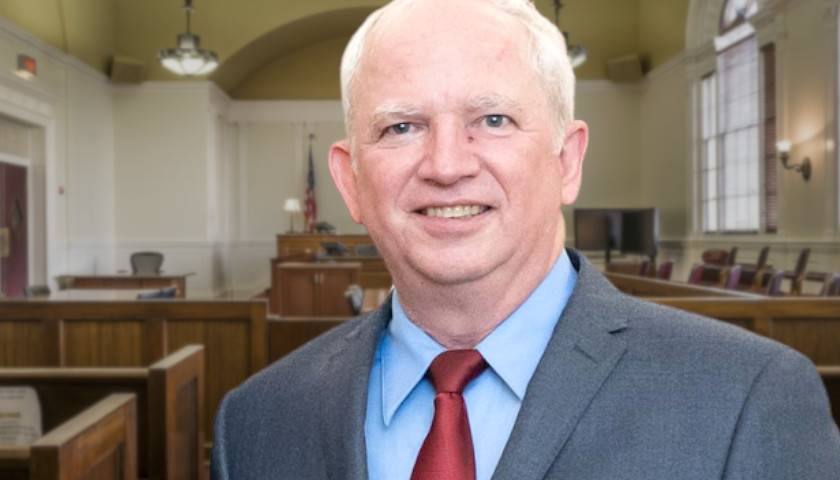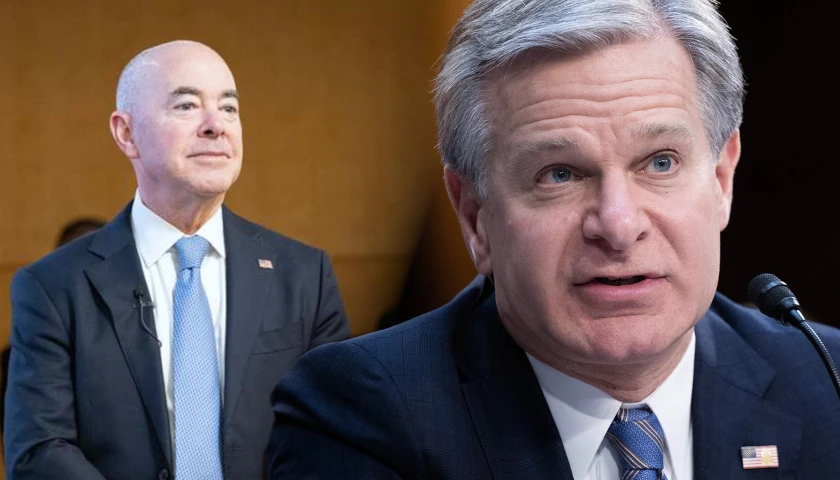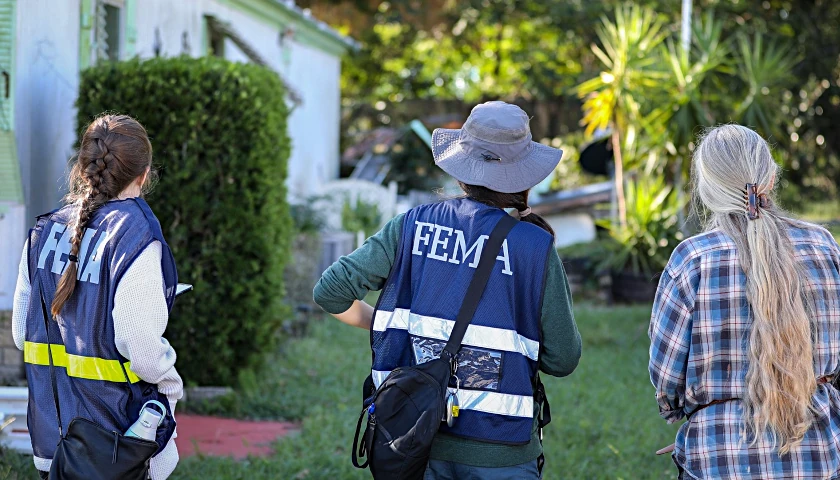The disbarment trial of Donald Trump’s attorney and constitutional scholar, John Eastman, concluded its fourth week on Friday, as Eastman’s team put on his case featuring their key witness, former Wisconsin Supreme Court Justice Michael Gableman. The Wisconsin Assembly contracted Gableman to conduct a small investigation into election fraud in the state’s 2020 election, the same issues prompted Eastman’s involvement in the election litigation in Wisconsin.
Eastman (pictured above) said during his testimony that although he was one of Trump’s attorneys, his advice wasn’t always taken. For example, Trump’s two lawsuits in Georgia were voluntarily dismissed after the January 6 protest since others decided they were open to debate. Eastman said he would not have backed down.
Gableman expanded on his testimony from Thursday, revealing that Wisconsin Speaker of the House Robin Vos didn’t want a “deep” investigation. Gableman said Vos eventually fired him and the team he’d compiled after eight months of work because it was “politically inconvenient.”
His team consisted almost entirely of out-of-state attorneys because not a single attorney in Wisconsin would agree to work with him on the project out of fear of retaliation. Eventually, a few months into the investigation, one Wisconsin attorney joined his team.
Eastman’s attorney, Randy Miller, spent much of the day asking Gableman about his findings, which he produced in primarily one report for the legislature. Part of his report went over the option for the legislature to decertify the election if they found fraud. Miller asked Gableman whether he agreed with Wisconsin election official Meagan Wolfe’s statement that their election was “conducted according to the law” and “in the open.” Gableman said no.
Gableman said he became very concerned about fraud involving the electronic voting machines. He said the voting machine companies — Dominion Voting Systems was the main one, then ES&S and Hart InterCivic — were “the opposite of cooperative” and “hindered my ability to get to the truth of whether there is fraud in the machines.” He said they “fought us every step of the way” with lawsuits to stop his team from trying to find out if they had safeguards in place. He encountered very concerning pieces of information, but nothing he could put together, such as WiFi connections to the internet and discovering that the machines count the ballots by taking images and converting them to a mathematical formula “so you end up with fractional votes.”
Another concern Gableman developed was discovering a contract between the Wisconsin Election Commission (WEC) and the controversial Electronic Registration Information Center (ERIC) that provided ERIC with voter data. He said the contract violated the law because it did not contain statutorily required protections for voter data. Gableman said there is no way to know what ERIC is doing with the data.
Gableman revisited his testimony from the previous day about Mark Zuckerberg’s Center for Tech & Civic Life (CTCL) employees using the election clerks’ databases to find likely Joe Biden voters who had applied for early ballots but hadn’t voted yet to track them down. He said he told the legislature that he believed this “materially affected” the election. He also referenced his earlier testimony about working with the Racine County Sheriff to refer criminal charges to the Racine County District Attorney (DA) on five of the six WEC commissioners. The DA told him that she could not file charges against them because she did not have enough resources.
The California bar’s attorney, Duncan Carling, objected to his answer about what the DA said as hearsay. California Bar Disciplinary Judge Yvette Roland, who recently donated to Democrats while serving as a judge, sustained the objection, even though she has allowed almost all of the hearsay Carling introduced by citing the disciplinary court’s relaxed rules for hearsay.
Gableman said the relationship with CTCL and election officials violated equal protection. CTCL gave money to the clerks in Wisconsin’s five largest cities to purchase mobile homes, which were converted into voting registration centers and centers. But he said they didn’t do this for everyone, which was treating Wisconsin voters differently. He added that only certain areas within the state’s five largest cities were selected, which were chosen by CTCL employees.
A Green Bay, Wisconsin clerk resigned her position since the mayor was bringing in people from Chicago and New York who didn’t care about election law, Gableman said, and didn’t want to be held accountable for all the illegalities. She wanted to hold the central vote tabulation at city hall where it was always held in Green Bay. But she was overruled by others, who were being instructed by Michael Spitzer-Rubenstein, the Wisconsin state lead for the left-of-center National Vote at Home Institute, who was getting funded to work with Wisconsin election officials by Zuckbucks, Gableman said.
Spitzer-Rubenstein forced them to hold it somewhere else since he had the authority per the contract. Also, Spitzer-Rubenstein, who wasn’t an election official, held the tabulation at the Hyatt instead. Gableman said people became curious and looked into his identity since he appeared to be running the whole operation.
When citizen observers approached him to ask questions, he’d try to duck them, Gableman said. He didn’t wear an ID tag like all elected officials must have. He finally called himself something like an “election inspector,” Gableman said when the observers asked him at 1 a.m. the night of the election if he’d signed in as required, and he said no.
Gableman said Spitzer-Rubenstein signed the Hyatt contract on behalf of the government and was the only one with keys to the hotel ballroom where all the completed ballots were stored. No one was allowed into that room without his authorization, Gableman found out. Spitzer-Rubenstein told the hotel which WiFi to install, including a hidden one up to his room on the 8th floor. He fought Gableman’s subpoenas and would not speak to him. When Carling objected to this testimony, claiming it was hearsay, the judge disallowed much of it.
Gableman said Spitzer-Rubenstein was also involved in Milwaukee’s election. He said Spitzer-Rubenstein brought in his people who administered the central count. He edited the regulations and rules for curing absentee ballots in Milwaukee and wrote the manual for resolving voter intent. None of his involvement was ever challenged or litigated.
Gableman discussed his findings that nursing home workers were forging residents’ signatures for absentee ballots and pressuring residents who had been adjudicated incompetent to cast ballots. He found that WEC wasn’t taking steps to make sure adjudicated incompetents weren’t voting. He said nursing home workers also violated the law by returning the ballot for the residents since the law requires the voter to put it in the mail or return it to the election officials. Carling objected to the testimony as hearsay, even though it was in Gableman’s public report, and the judge sustained the objection.
A former trial lawyer and evidence professor, who preferred not to be identified for fear of retaliation, said this reflected a pattern by the judge of requiring a heightened hearsay standard for Eastman and his witnesses. He told The Arizona Sun Times, “Why does Eastman have to prove the truth of the matter asserted rather than that he had a reasonable basis for his legal opinion? If introduced for this limited purpose, it’s simply not hearsay. Judges and lawyers get hearsay wrong all the time.”
Roland objected to Gableman discussing the Wisconsin Supreme Court election challenge case Trump v. Biden because he wasn’t an “expert” in that area. Miller shot back that he hasn’t been designated an expert on anything, and pointed out that he oversaw the election investigation besides being a former Wisconsin Supreme Court justice. “I don’t know of anyone who is more qualified,” he said. Roland dismissed his reasoning. Trump v. Biden was decided four to three and mostly dismissed on laches; the majority claimed it was filed too late.
Gableman wrote in his report that WEC’s “directives mandated and/or encouraged violations of Wisconsin law and the election fraud statute.” He found unlawful voting by wards under guardianship — they weren’t eligible to vote as wards — which was “left unchecked by election officials” and “wasn’t recorded in the voter database,” a violation of the federal Help America Vote Act (HAVA).
Another serious violation he found was that election officials failed to record noncitizens in the voter database so they were able to vote. Wisconsin law requires citizenship to vote. He said that WEC had no process by which they could exercise their lawful responsibility to do this. The noncooperation of WEC made it impossible for him to conduct an investigation to determine if there were illegal votes. WEC hired law firms to fight his legislative subpoenas.
Election officials violated the law by illegally declaring on another person’s behalf that they are indefinitely confined, Gableman said. The Wisconsin Supreme Court ruled that only the person indefinitely confined can declare that. He said it was because outside corporations pressured election officials to drop ballot security measures.
Gableman said his report concluded there were “gross vulnerabilities” and “no safeguards at all” regarding voting by three types of ballots handled illegally: wards under guardianship, noncitizens or military serving overseas, and Wisconsin residents claiming to be temporarily overseas. He said there was “no method to verify their identification at all” since those voters are excused from showing ID. They can make up a name, make up a home address, and then request ballots be sent to one particular address.
Another finding in his report was that Wisconsin clerks illegally added missing information onto absentee ballot applications. WEC came out with guidance that said if the clerk has the time and can reasonably ascertain the information, which was often the address of the witness, then they can complete the missing information, he said. Sometimes, the clerks used red ink since they wanted the application to be reviewable in case of litigation. But even if they did, the ballot had already been counted, mixed in with all the other ballots with no way to trace it back.
After Miller completed his direct examination of Gableman, Carling conducted a cross-examination. Most of his questions involved nitpicking technical aspects of Gableman’s findings, such as “Did you fully complete your investigation of nursing home voting?”
Gableman frequently disappointed Carling with his responses, due to seeing things very differently. For example, Carling asked, “Would you agree in 2020 that there was a global pandemic going on?” Gableman responded, “I don’t like that term ‘global pandemic.’”
The trial is being livestreamed and is expected to continue through next week and a few more days after that unless interrupted by the Georgia prosecution of Eastman. It resumes on Tuesday at 10 a.m. PST.
– – –
Rachel Alexander is a reporter at The Arizona Sun Times and The Star News Network. Follow Rachel on Twitter. Email tips to [email protected].
Photo “John Eastman” by johneastmanlegaldefensefund.com.





